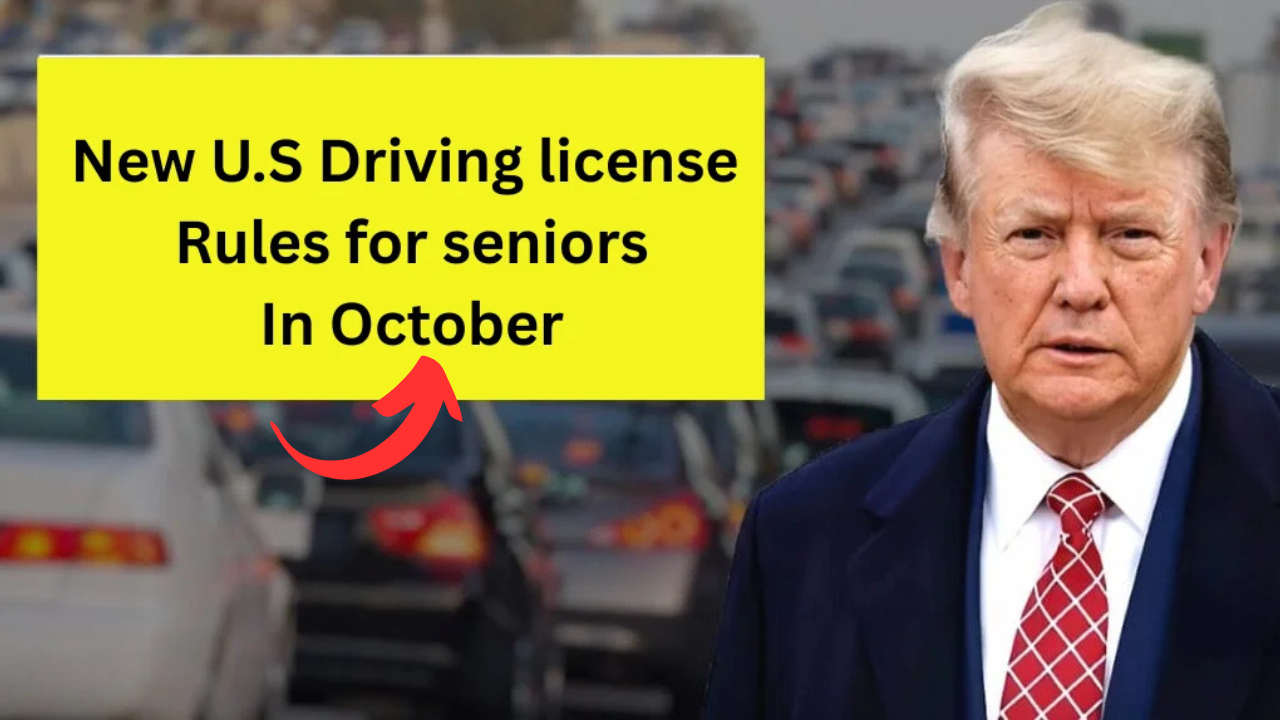US Driver:Beginning in October 2025, senior drivers across the United States will experience significant changes to their driver’s license renewal process. The new rules, announced jointly by the Department of Transportation (DOT) and individual state motor vehicle departments (DMVs), aim to improve road safety while maintaining the independence and mobility of older adults.
With more than 35 million licensed drivers aged 70 and older, these updates reflect the government’s increasing focus on ensuring seniors can drive safely as age-related challenges such as slower reaction times, poor vision, and certain health conditions become more common.
Let’s take a closer look at what these new rules mean for senior drivers and how to prepare for the upcoming changes.
Why Are The New Rules Being Implemented?
America’s roads are becoming busier than ever, and the number of senior drivers has increased more than ever. Although most senior citizens are responsible and cautious drivers, National Highway Traffic Safety Administration (NHTSA) statistics show that seniors are more likely to be seriously injured in crashes due to age-related impairments.
The new rules are not meant to punish senior drivers. Rather, they focus on early detection of potential driving problems, improved medical awareness, and ensuring safe driving. The goal is to create a fair system that supports competent older drivers while also identifying those who may need additional evaluation or guidance.
Key Rule Changes Taking Effect October 2025
-
In-Person License Renewal Mandatory
Starting October 2025, drivers aged 70 and older will no longer be able to renew their licenses online or by mail. They will be required to visit their local DMV in person to renew. This change allows for a basic health and vision assessment to ensure the security and accuracy of information.
2. Vision and Cognitive Testing
A short vision test will be mandatory during each renewal. In some states, drivers may also be required to undergo reaction time or cognitive testing to assess alertness and memory. These tests are simple and designed to identify any risks that may affect driving ability.
3. License Validity Shortened
Currently, driver’s licenses in many states are valid for 5-8 years. Under the new rules, licenses for seniors aged 70 and older will be valid for a maximum of 3 years. This ensures more frequent checkups for any changes in health or vision.
4. Medical Condition Reporting
Drivers must disclose certain medical conditions that may affect safe driving—including dementia, diabetes-related vision loss, or severe arthritis. Depending on state laws, physicians may also be authorized to report conditions that may affect driving ability.
5. Optional Senior Refresher Courses
Some states are introducing optional refresher driving courses specifically for older adults. These courses cover changes in road laws, safe driving techniques, and adapting to new car technologies. Completing one of these courses may also qualify seniors for insurance discounts.
How seniors can prepare for the new rules
These changes may seem overwhelming, but preparation can make the transition easier. Senior drivers can do the following before October 2025:
- Get annual eye exams to rule out any vision problems.
- Have your doctor review your medications to understand any adverse effects on driving.
- Keep your records updated with the DMV, including address and contact information.
- Consider taking senior driver safety courses through organizations like AARP or local community centers.
- If transportation or mobility is an issue, ask family for assistance during the renewal process.
Transportation Secretary Pete Buttigieg said, “We’re not taking away freedom—we’re ensuring confidence and safety for all road users.”
Balancing Safety and Independence
For seniors, driving often symbolizes independence and self-reliance. These rule changes are designed with compassion and practicality in mind – they aim to protect older adults without unnecessarily restricting their mobility.
Most seniors who drive healthy, alert, and carefully will not notice any significant difference beyond a few additional adjustment steps. However, for those who are having difficulty, this system will now provide assistance or intervention before an accident occurs.
Final Thoughts
The change in licensing rules in October 2025 marks a major shift in the way senior drivers are supported in the US. By focusing on safety, health, and continuous evaluation, this system ensures that seniors continue to drive responsibly for as long as possible.
The goal isn’t to snatch away the keys, but to keep everyone safe, informed, and confident on the road.
FAQs
1. When will the new rules for senior drivers start?
The new driving license regulations for seniors aged 70+ will take effect in October 2025.
2. Will seniors have to retake a driving test?
Not necessarily. A road test will only be required if the DMV identifies serious safety or health concerns.
3. Can seniors renew their licenses online?
No. From October 2025 onward, renewals must be done in person for drivers 70 and older.
4. How long will the new licenses be valid?
Licenses for drivers over 70 will be valid for a maximum of 3 years, depending on the state.
5. Are medical tests mandatory?
A vision test is required for all renewals, and additional screenings may be requested based on state laws or health disclosures.

